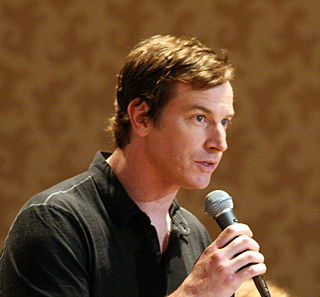A Quote by Jamaica Kincaid
The thing about writing in America is that writers in America have an arc. You enter writing as a career, you expect to be successful, and really it's the wrong thing. It's not a profession.
Quote Topics
Related Quotes
I've never had a mentor personally of any kind. It feels like, generally, in the writing world or the art world, it's more of a thing in America, because you have writing programs, which we don't have. You have these amazing writers who are teachers. I never did a writing program so I never met a writer until I was published. I guess I can't really explain my compulsion for writing these kind of mentor characters.
That's one thing brands are understanding is, I'm the blogger who's not writing about fashion. I'm not writing about beauty. I'm not writing about gossip. I'm not writing about politics. I'm writing about all of that. I'm the person they can come to if they just want to reach people who care and have their fingers on pop culture.
When you're researching things that have happened, the clear narrative arc is not there already. This is the problem of writing nonfiction for me - writing nonfiction which is about serious subjects and has serious political and social points to make, yet which is meant to be popular to a degree - what happens when the facts don't fit a convenient narrative arc? I guess that for a lot of nonfiction writers that is a central challenge.
The cool thing about 'Transparent' is that the show is funny but not like a sitcom is funny. It all comes down to the writing... The writers on that show are so good that you don't have to worry about anything. There are so many things that can go wrong making a TV show or a movie, but if the writing's good, that's, like, 95 percent of it.
When you're writing - when I'm writing anyway - I'm writing out of different kinds of preoccupations and obsessions, different forms of drivenness, and so you're really hostage those while writing. I am, anyway. And it's only when you finally take the finished thing out of the furnace that you see what it was that went into the making of the thing.
Writing is not a great profession as a lot of writers proclaim. I write because this is something I can do. Another thing—very often I think a lot of writers write because they have failed to do other things. How many writers can’t drive? A lot. They’re not practical. They are not capable in everyday life.
In my mind, only one inviolable precept exists in terms of being a successful writer: you have to write. The unspoken sub-laws of that one precept are: to write, you must start writing and then finish writing. And then, most likely, start writing all over again because this writing "thing" is one long and endless ride on a really weird (but pretty awesome) carousel. Cue the calliope music.
The difference when I'm writing a story versus writing a joke is that writing a joke is so much more about the structure and it's less about the conversation. To me, the thing that I love about stand-up is the intimacy between performer and audience.To get it even more conversational was something that really appealed to me and that I really enjoyed doing. My early experiments with it, with just telling a story from my life on stage, it was so satisfying to do. And seemingly for the audience as well. It's a different thing, and it's a different feeling and a different vibe.
Joss Whedon writes beautiful drama. His sensitivity and his sense of drama and scenes are pretty exceptional. There's no one else writing like him, really, in sci-fi and TV. That's not to say there are no astonishing writers on TV. I was nervous about coming to America and playing an English person who speaks very English when all the writers are American, because it's a very particular thing to imitate, and if it's badly imitated, it sounds painfully contorted and silly. And he writes very well for English people. It was Joss Whedon who persuaded me.







































